Gut-Brain Axis
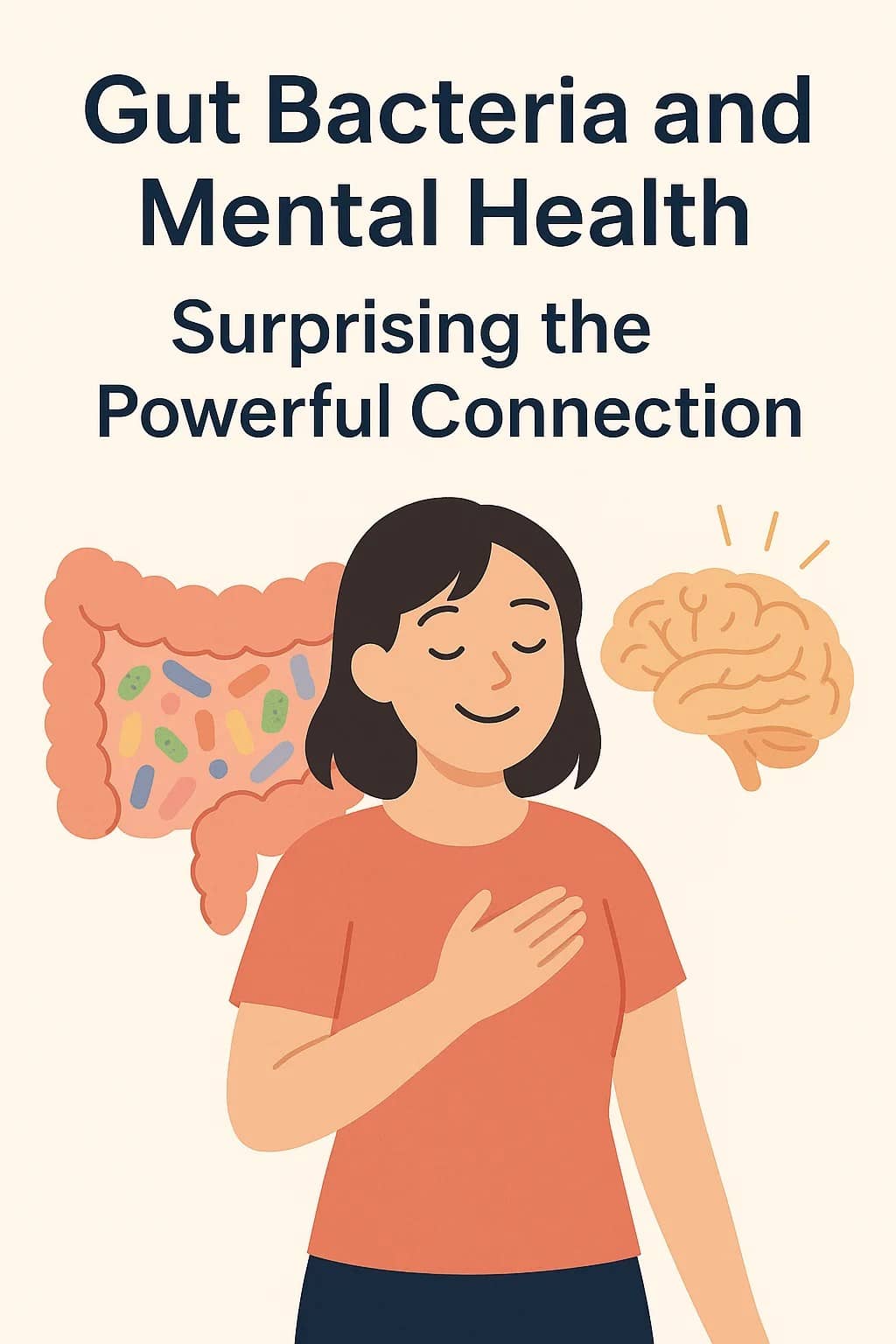
Gut bacteria and mental health disorders might seem surprising. However, it is one of the most exciting areas of scientific research today.
Gut bacteria have roles that extend beyond digestion. They play a critical role in influencing mood and behavior. They can even affect the risk of mental illnesses.
Recent studies show that the gut-brain axis is a complex communication network. It links the gut and the brain and has profound effects on mental health.
By understanding how gut microbiota affect neurological functions, we can uncover new strategies. These strategies can help in treating mental health conditions naturally. They also aid in preventing them.
In this article, we explore the deep links between gut health and mental well-being. We examine how disruptions in gut bacteria can lead to disorders. Most importantly, we discuss how you can nurture a healthy gut to support a healthy mind.
Understanding Gut Bacteria: Gut Bacteria and Mental Health
The human gut is home to trillions of microorganisms. These include bacteria, viruses, fungi, and other microbes. Collectively, they are known as the gut microbiota.
These tiny organisms are not just passive residents; they actively participate in crucial bodily processes.
Key Functions of Gut Bacteria:
- Aid digestion by breaking down complex carbohydrates and fibers.
- Produce essential vitamins such as B vitamins and vitamin K.
- Regulate immune function to prevent infections.
- Control inflammation throughout the body.
A balanced gut microbiota acts like an internal ecosystem, maintaining harmony in digestion, immunity, and even brain chemistry.
However, when this balance is disturbed, it leads to a condition called dysbiosis. This condition can trigger systemic inflammation. It may also cause neurological changes, contributing to various mental health disorders.
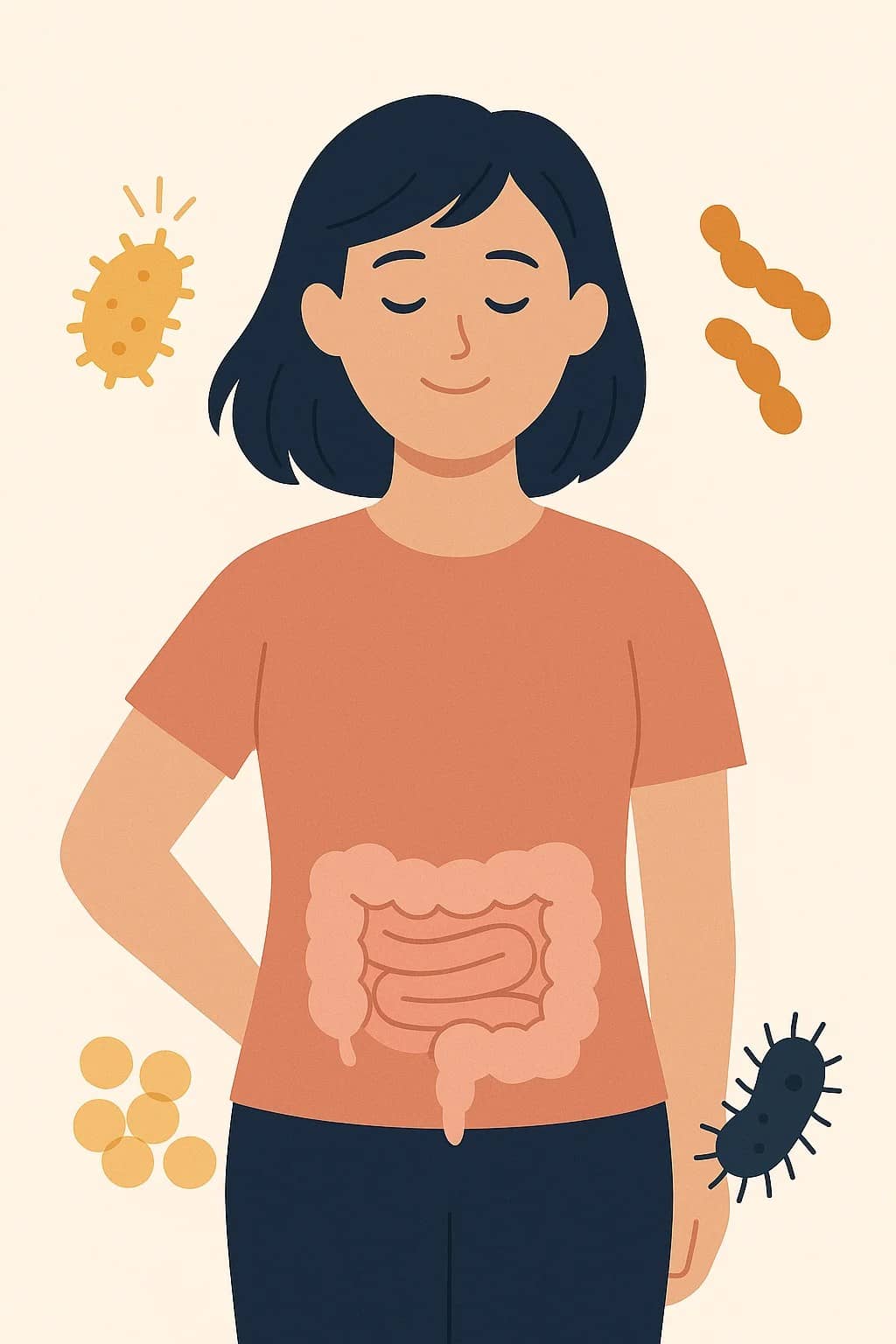
How the Gut-Brain Axis Works: Gut Bacteria and Mental Health
The gut-brain axis is a complex communication network that links the gastrointestinal tract to the brain. This two-way system involves direct and indirect pathways, including the nervous system, immune system, and hormones.
Key Components of the Gut-Brain Axis:
- Vagus nerve — the main “highway” carrying signals between gut and brain.
- Immune system — gut bacteria influence systemic inflammation, affecting brain function.
- Neurotransmitter production — gut bacteria produce chemicals like serotonin, dopamine, and GABA that regulate mood.
Approximately 90% of the body’s serotonin — a key neurotransmitter linked to happiness — is produced in the gut!
When the gut microbiota is healthy, communication is smooth, helping to regulate emotions and stress responses. When dysbiosis occurs, this messaging is disrupted, potentially leading to mental health challenges such as anxiety, depression, and cognitive decline.
Understanding the gut-brain axis gives us insight into how nurturing gut health can significantly impact our emotional and psychological resilience.
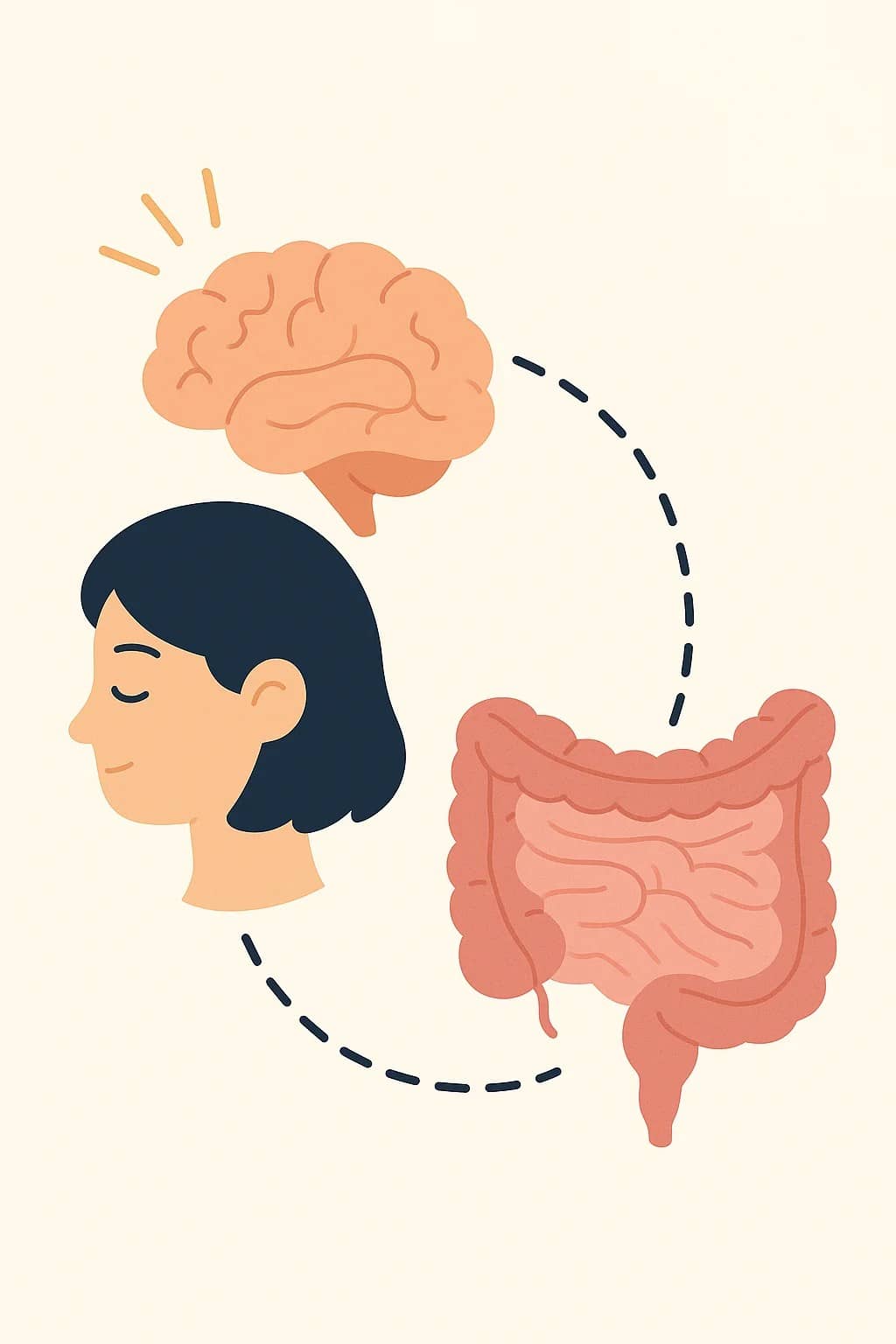
Gut Bacteria’s Impact on Mental Health
The relationship between gut bacteria and mental health is far from superficial. Emerging research shows that imbalances in gut microbiota can directly influence the onset. It can affect the severity and the progression of various mental health disorders.
Major Mental Health Disorders Linked to Gut Dysbiosis:
- Depression
Individuals with depression often show reduced microbial diversity and lower levels of beneficial bacteria like Lactobacillus and Bifidobacterium. - Anxiety Disorders
Gut bacteria regulate GABA, a neurotransmitter that helps calm nervous activity. Disruptions can lead to heightened anxiety. - Autism Spectrum Disorders (ASD)
Children with autism often have gastrointestinal symptoms. They also have altered gut microbiota profiles. This suggests a strong gut-brain link. - Schizophrenia
Dysbiosis may contribute to systemic inflammation, a potential factor in the development and severity of schizophrenia. - Bipolar Disorder
Changes in gut bacteria diversity have been associated with mood swings and the progression of confusing episodes.
Healthy vs Unhealthy Gut Influence on Mental Health
| Factor | Healthy Gut Microbiota | Dysbiotic (Unhealthy) Gut Microbiota |
|---|---|---|
| Neurotransmitter Production | Balanced (serotonin, GABA) | Imbalanced, low production |
| Immune System Response | Regulated inflammation | Chronic inflammation |
| Stress Response | Controlled and adaptive | Heightened, chronic |
| Emotional Stability | Improved resilience | Mood instability, depression risk |
Maintaining a healthy gut environment is crucial to promoting emotional stability, cognitive function, and overall mental well-being.
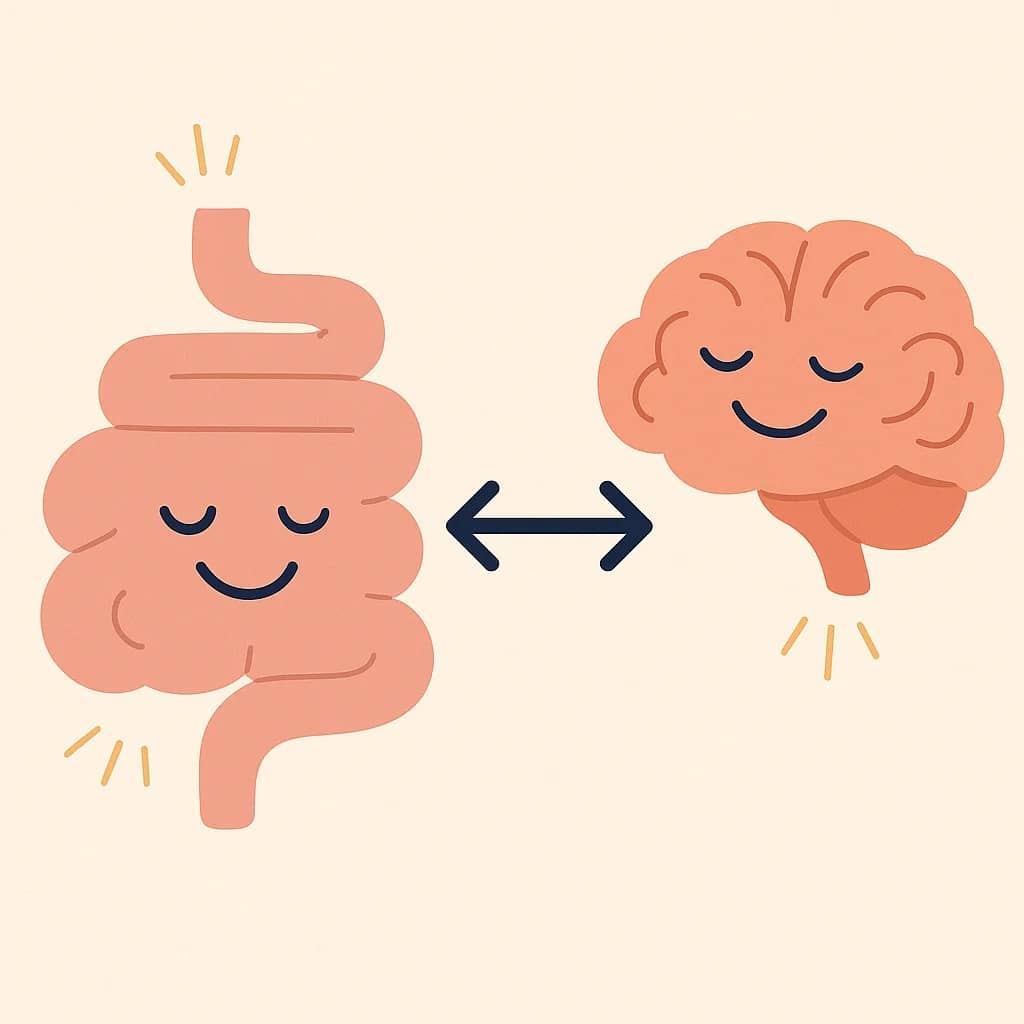
Factors That Disrupt Gut Bacteria
Several everyday factors can negatively affect the gut microbiota, disrupting the delicate balance needed for optimal physical and mental health. Understanding and managing these factors is crucial for preserving both gut and brain wellness.
Major Disruptors of Gut Health:
- Poor Diet
High sugar, processed foods, and low-fiber diets feed harmful bacteria and starve beneficial strains. - Chronic Stress
Ongoing emotional stress alters gut permeability (leaky gut) and disrupts microbiota composition. - Antibiotic Overuse
While necessary at times, antibiotics can wipe out beneficial bacteria along with harmful ones, leading to dysbiosis. - Lack of Sleep
Inconsistent sleep patterns disturb the body’s circadian rhythm, which also affects gut bacterial balance. - Sedentary Lifestyle
Lack of physical activity reduces microbial diversity, a key marker of a healthy gut. - Environmental Toxins
Exposure to pesticides, pollution, and food additives can damage gut integrity and microbial populations.
Even a single factor, like frequent antibiotic use, can have a cascading negative effect on gut health. This, in turn, affects mental well-being. Fortunately, most of these disruptors can be controlled through conscious lifestyle choices.
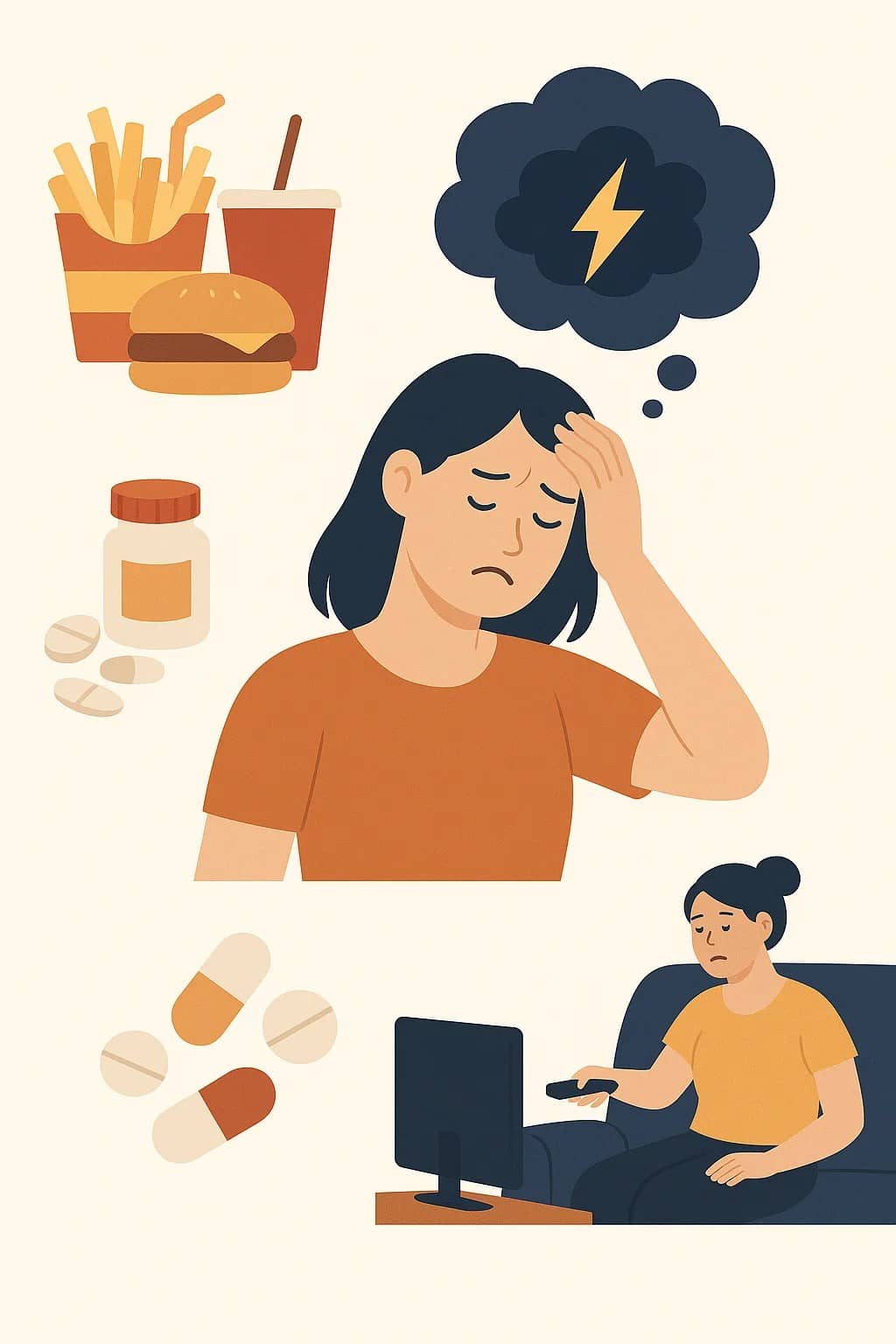
Ways to Improve Gut Health for Better Mental Well-being
Supporting a healthy gut ecosystem is one of the most powerful things you can do for your mental health.
Even small daily changes can gradually rebalance your microbiota and positively impact your emotional resilience.
Effective Strategies to Improve Gut Health:
- Eat More Fiber-Rich Foods
Incorporate fruits, vegetables, legumes, and whole grains that feed beneficial bacteria. - Take Probiotics and Prebiotics
Probiotics add good bacteria, while prebiotics (like garlic, onions, bananas) feed them. - Manage Stress Mindfully
Meditation, deep breathing, and journaling help protect gut integrity and lower inflammation. - Exercise Regularly
Moderate aerobic activity promotes gut bacterial diversity, strengthening your gut-brain axis. - Prioritize Sleep Hygiene
Maintain a consistent sleep schedule and avoid electronic screens at night to support microbiota balance. - Limit Antibiotic Use
Use antibiotics only when absolutely necessary and always replenish gut health afterward with probiotics. - Reduce Intake of Processed Foods and Added Sugars
These feed harmful gut bacteria and suppress beneficial species.
By intentionally cultivating a diverse and resilient gut microbiota, you also build emotional resilience. This leads to improved mental stability. It also helps with better mood regulation and enhances cognitive function.

Gut Bacteria’s Impact on Mental Health
Recent findings also highlight that gut bacteria influence the Hypothalamic-Pituitary-Adrenal (HPA) axis, the central stress response system.
When the HPA axis becomes overactive due to gut dysbiosis, individuals may experience heightened anxiety, depressive moods, and cognitive impairment.
For instance, mice studies have shown that transferring gut microbiota from anxious individuals into germ-free mice can induce anxious behaviors. This provides strong evidence for the microbiota’s role in emotional regulation.
Specific strains, including Bifidobacterium longum and Lactobacillus rhamnosus, have shown anxiolytic and antidepressant effects. These effects are seen in both animal and human trials. This points toward exciting future directions for probiotic-based mental health therapies.
Ways to Improve Gut Health for Better Mental Well-being
In addition to probiotics and prebiotics, fermented foods are excellent natural sources of beneficial bacteria. These foods include yogurt, kefir, sauerkraut, kimchi, and miso.
Incorporating these foods regularly can help diversify the gut microbiome naturally.
Furthermore, mindful eating practices — such as eating slowly and chewing thoroughly — promote better digestion. Minimizing distractions during meals supports gut health by optimizing enzyme release and nutrient absorption.
Another valuable strategy is using fiber supplements like psyllium husk or inulin when dietary fiber intake is insufficient.
Gut bacteria thrive on fermentable fibers. Ensuring an adequate intake fuels their growth. This fosters a balanced microbiota ecosystem critical for mental health.
Conclusion
Maintaining a healthy gut can significantly impact your emotional and mental well-being. This can be achieved through diet, stress management, sleep, and lifestyle changes. Even small daily adjustments make a difference. You can add fiber-rich foods or practice mindfulness. These actions create ripples that strengthen both your gut and your brain over time.
Taking care of your gut health is not just about physical vitality. It’s a direct investment in your mental peace. It also enhances clarity and happiness.
Also read
Reference Article
Call to Action
Take charge of your health today!
Nourish your gut, nurture your mind, and unlock your full energy and emotional potential.
Explore more tips and wellness guides at InformativePicks.com!
Disclaimer
Disclaimer:
This article is for informational purposes only and does not replace professional medical advice.
Always consult with qualified healthcare providers for diagnosis and personalized treatment plans.
Discover more from I-PICKS
Subscribe to get the latest posts sent to your email.



1 thought on “Gut Bacteria and Mental Health: Surprising the Powerful Connection”